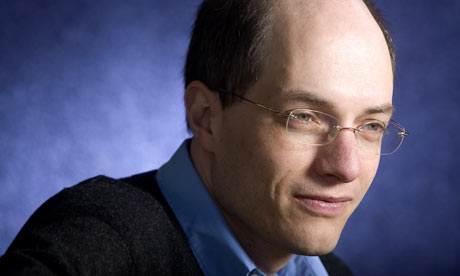 |
| Grey, nondescript cover to convince us it's a Serious Monograph |
The bit of the cycle I hadn't identified until recently is the part where I forget that the cycle actually exists. Every time I start a new book of his, I kid myself that this time it will be different, that we can work through our disagreements like responsible adults. And so it was with an air of optimism that I succumbed to the 'School of Life' display in the Norrington Room at Blackwells in Oxford (a cardboard stand placed suggestively next to the philosophy section), picked up How to Think More About Sex by AdB himself, and spent the next half an hour finding two other books to reach '3 for 2' fulfilment. (One of them, by the way, was The Marriage Plot by Jeffrey Eugenides, which I'm rather enjoying.)
In his characteristically seductive way, de Botton begins by saying some things that need to be said, briefly satisfying the image we might have of the public philosopher. "It is rare to get through this life without feeling ... that we are somehow a bit odd about sex." Yes! my mind cried. Yes, that's true! Oh, AdB, keep going. Society's problems await your perspicacity! He points out, quite correctly, that we don't think much about sex as a puzzle any more, that the liberal age is, theoretically, one that has assimilated sex quite happily, despite its overwhelming tendency to shatter all steady, rational things, to meddle with the minds of the most educated, analytical individuals in truly shocking ways. We are falsely complacent about it.
And then it all starts to go wrong. Promising ideas -- that most of us find erotic arousal in things considered shameful by society -- are briefly discussed and then dropped, only to be contradicted later on by AdB's optimistic imaginings on what a pornography for an enlightened future might look like:
... based around such qualities as intelligence (showing people reading or wandering the stacks in libraries), kindness (people performing oral sex on one another with an air of sweetness and regard) or humility (people caught looking embarrassed, shy or self-conscious).This sentence made me laugh out loud because of its naivety. If the erotic urge comes, as he suggests earlier on, from the breaking-down of formal conventions, the release of all the strictures we hold ourselves together with, then how could we be expected to find excitement in these utterly harmless, virtuous scenes? One can't solve the problem of trying to integrate sex into the rest of life by 'persuading' people to find only laudable things erotic.
These utopian musings are pretty typical of AdB at his most broad-brushed and infuriating. (See Religion for Atheists.) In the same vein, he imagines a future in which all couples go to weekly therapy sessions to thrash out their disagreements minor and major. I can't really decide on the point of this bit. Does he really believe this possible for the future? What about the expense, in terms of both money and time? Doesn't he think couples would prefer to become better communicators without needing a third person to open the channels for them? Does he have some undeclared vested interest in The Rise of the Age of the Therapists?
Also, for someone so well-read, AdB doesn't half get simplistic. He argues that what we find attractive is a reflection of what we were lacking in our childhoods. He actually prints two photos of Scarlett Johansson and Natalie Portman and attempts some kind of analysis of why we might find Scarlett attractive ( her face suggests "just a little too much of a taste for excitement and melodrama") rather than Natalie ("the steely, practical resolve we detect in Ms Portman's forehead"). Hmmm. This is the intellectual equivalent of AdB leaving the toilet seat up. Perhaps, I thought in a spurt of silent sarcasm, this book should be renamed Pig Freudianism, and How Not To Use It.
Not that he uses a psychoanalytic approach all the way through, however. In the conclusion, he attempts to get evolutionist on yo' ass by arguing that all artistic activity, all desire to educate oneself or to design and produce beautiful clothes and food, is ultimately directed towards satisfying the sexual urge. We do all this to impress potential partners (i.e. the potential parent of our child).
 |
| Look at me, I'm practically Foucault! |
De Botton is sporadically convincing when he's discussing what sex 'is' in the modern world, though not consistently. But he always has to go too far and try to persuade us that not only can he see with startling clarity the problems of our age, he knows how to fix them, too. Now, if he's right, the biggest problem only lies in our failure to recognise him as the greatest Western thinker of the 21st century and to appoint him our lord and emperor. But, as you may have noticed, we haven't done this. Perhaps one day he'll realise that this is because the problems of mankind are real, knotty, impossible-to-get-hold-of problems, and that, if all the philosophers of the last three millennia can't solve them, it's unlikely that a milky-faced Swiss millionaire can either.